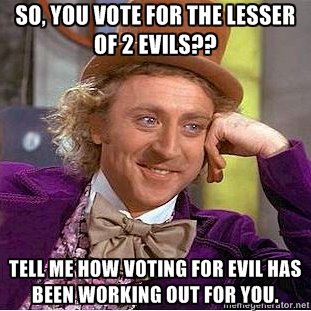Book review: We Won't Get Fooled Again by Gregg Jackson and Steve Deace
By Harlan Brown
May 28, 2012
I enjoyed reading We Won't Get Fooled Again: Where the Christian Right Went Wrong, and How to Make America Right Again. I really identified with the first part of the title. Like authors Gregg Jackson and Steve Deace, I've been fooled by politicians, and I don't want to let it happen again.
Learning from the book
I learned from the book. I was already familiar with some of the book's information, which is why my wife and I no longer support certain organizations that we once supported. On the other hand, many details were new to me. I flunked the short multiple-choice quiz in the book's introduction. But I learned some interesting facts from the quiz.
I don't want to be like Charlie Brown, who always trusts Lucy van Pelt to hold the football in place for him to kick. Year after year, he makes the same mistake and tries to kick the football. At the last second Lucy jerks the ball away, and Charlie goes flying through the air, screams "Aaugh!", and crash-lands on his back. He never seems to learn.
In We Won't Get Fooled Again, written in 2011, Gregg and Steve challenge conservative Christians to learn from the mistakes of the past 30 years. The fundamental question is this: "Is America better off than it was 30 years ago before Christians invaded the political arena?" In answer to the question, the authors expose the lack of progress that Christian conservatism (the Religious Right) has made in advancing righteousness in America. They present a series of interviews with conservative leaders who describe the problems. Then they insert an insightful chapter on laws: "Dr. Strangelaw: How Christians Learned to Stop Worrying About Self-Government and Love Judicial Oligarchy." The authors conclude with their proposed solutions.
Interviews
Interviewing seems to come naturally for Gregg and Steve. Both have backgrounds as radio talk show hosts. The interviews in We Won't Get Fooled Again are with the following persons:
- Steve Baldwin, director of the Council for National Policy
- David Barton, head of Wallbuilders
- Ann Coulter, author and commentator
- Bob Enyart, spokesman for American Right to Life and Colorado Right to Life
- Joseph Farah, founder and publisher of World Net Daily
- Michael Farris, founder and chairman of the Home School Legal Defense Association
- Gary Glenn, president of the Michigan chapter of the American Family Association
- Joe Glover, director of the Family Policy Network
- Buddy Hanson, president of the Grace and Law Christian Policy Network
- Brannon Howse, founder and president of the American Family Policy Institute and of Worldview Weekend
- Peter LaBarbera, president of Americans for Truth
- Richard Land, head of the Ethics and Religious Liberty Commission for the Southern Baptist Convention
- John Loffton, editor of TheAmericanView.com
- Tom Minnery, senior vice president for government and public policy, Focus on the Family
- Judge Roy Moore, president of the Foundation for Moral Law
The "Dr. Strangelaw" chapter includes excerpts from interviews with the following legal experts:
- Dr. Edwin Vieira, a practicing lawyer who holds four degrees from Harvard
- Judge Tom Parker, an associate justice on the State Supreme Court of Alabama
- Michael Peroutka, an attorney who co-founded the Institute on the Constitution
A recurring theme
A recurring theme in We Won't Get Fooled Again is the lack of progress in advancing righteousness in America. Interviewee after interviewee presents evidence to support that point. The authors assert that the conservative movement, founded upon Judeo-Christian values and principles, has sacrificed those core values at the altar of "getting a seat at the table." Gregg writes on Page 31 that "it was increasingly obvious to me that the conservative movement had devolved into a movement whose central purpose was access to and acquisition of political power."
The authors admit that they had put too much trust in the Republican Party and assert the spiritual nature of our nation's problems. Gregg writes:
"Republican good, Democrat bad" was essentially my motto and mindset. By the grace of God, I came to see that what ailed America was not too many liberals. I came to understand instead that America's major problem is not political but spiritual, and that therefore the only real solution is not political but rather it's spiritual.
He concludes:
The bottom line is that the conservative movement, founded on the protection, preservation and advancement of Biblically-defined morality, has essentially devolved into a huge money-making industry whose leading organizations and pundits have too often compromised the core values and beliefs of the Christian grassroots for power, prestige and prosperity.
A recurring name: Mitt Romney
A recurring name in We Won't Get Fooled Again is Mitt Romney. Steve writes on pages 35-36:
It was interesting to note that even after his alleged pro-life conversion, Romney signed his infamous "Romneycare" state-mandated healthcare plan into law, which included a provision for taxpayer-funded, $50 co-pay elective abortions.
As discussed elsewhere in the book, Romney also:
- Was America's founding father of same-sex "marriage"
- Opposes bans on homosexual scoutmasters
- Forced Catholic Charities to place children with same-sex couples even though he wasn't required to by law
- Boosted funding for homosexual, bisexual, and transgender "education" starting in kindergarten
Page 208 explains why Mitt Romney not the Massachusetts supreme court is to blame for same-sex "marriage" in Massachusetts. Page 205 explains how the concept of just and unjust laws propounded by Rev. Dr. Martin Luther King Jr., Saint Augustine, and Saint Thomas Aquinas is relevant to issues such as marriage and abortion. (Augustine wrote, "An unjust law is no law at all.")
Strategy on the abortion issue
When interviewed by Steve and Gregg in May 2010, Bob Enyart was particularly outspoken in his assessment of Republican strategy on the right-to-life issue:
This strategy turns the pro-life issue into a fundraiser and a partisan tool, because you know if abortion was outlawed the Republican Party would have a much harder time motivating its base. There are many Republicans who don't really care whether abortion is banned or not, but they market themselves as pro-life for the purpose of getting campaign funds and Christian votes. That should be obvious to us now, because it's been going on for decades, but many of the national Christian ministries have bought into that strategy because it provides them with a revenue flow that increases during primaries and during general elections.
Enyart concludes:
Here is what their strategy boils down to: my mass murderer is better than your mass murderer. The Democrats have politicians who will kill millions, and the Republicans have politicians who will kill millions of innocent children. I believe this is an abomination in the eyes of God.
Although Gregg and Steve don't describe themselves as 21st century abolitionists, I think the term applies. They are aborticide (induced abortion) abolitionists. They are committed not to slowing down the Holocaust of the Unborn but to ending it.
Liberal vs. conservative
Regarding judges, the authors write in We Won't Get Fooled Again:
There's been a lot of debate in this country in recent years about what kind of judges should be appointed. Do we want strict constructionists or activist judges?
Perhaps the answer is neither.
What we are looking for are righteous judges. The kind that know where law comes from, know who the ultimate lawgiver is, and that know who they're eternally accountable to for upholding their sworn oaths of office.
Both authors are conservatives but make it clear that Christian moral values trump not only Democrat vs. Republican values but also liberal vs. conservative values. They write:
Liberals like to be judged by their intentions, and conservatives want to be judged by their results, but we believe neither approach is Biblical. Instead, we believe the Bible teaches that God judges us by our motives.
The heart of the matter
This brings us to the heart of the matter. In We Won't Get Fooled Again the authors quote Founding Father John Adams, who said, "Duty is ours but outcomes belong to God." They add that the heart of the matter is "the condition of our hearts." Their formula for cultural renewal is this:
repentance + reformation = revival
They write:
Unfortunately, even as polls show the majority of Americans believe their country is headed down the wrong track, humility remains in short supply in America today. Like the stubborn people in the time of the Old Testament prophet who believed that the Temple remaining in Jerusalem was proof that God was pleased with them regardless of how unfaithful they were to Him, we seem to believe that as long as we plant the flag, take a few Bible verses out of context, and end our patriotic pleas with "God bless America," He will.
We are playing a very dangerous game.
Gregg and Steve propose a framework for reformation. Part of that framework is this: "Focus on the most righteousness you can do, not the lesser of two evils." A reader of We Won't Get Fooled Again who does not believe in the Creator God who is involved in human affairs may find it difficult if not impossible to comprehend and accept such a concept. Believers who apply the proposed framework for reformation won't get fooled again.

